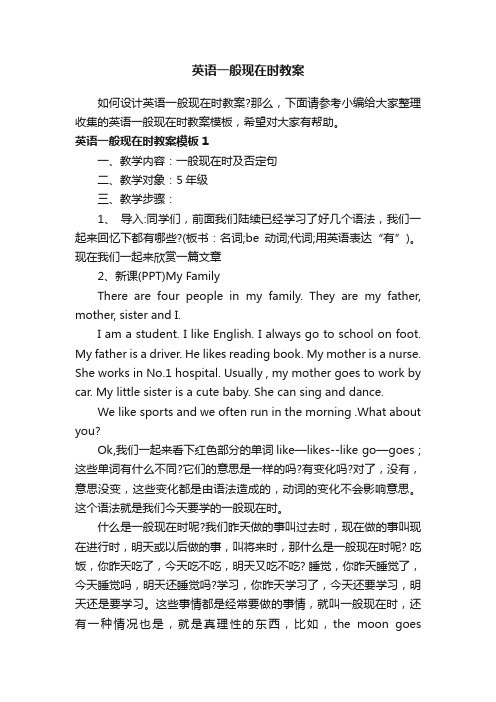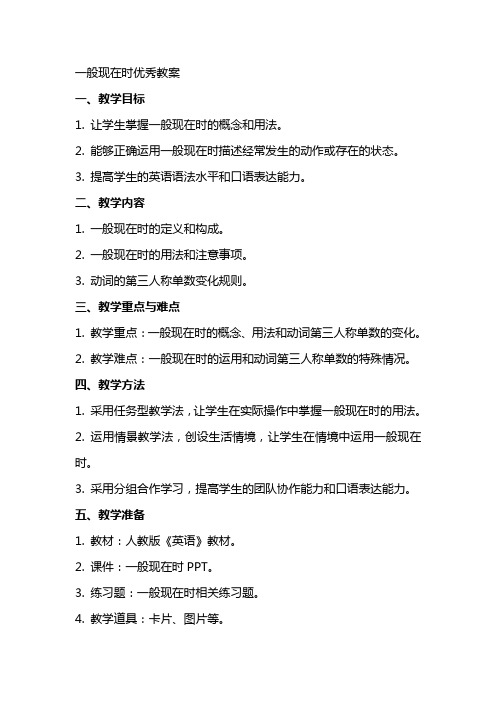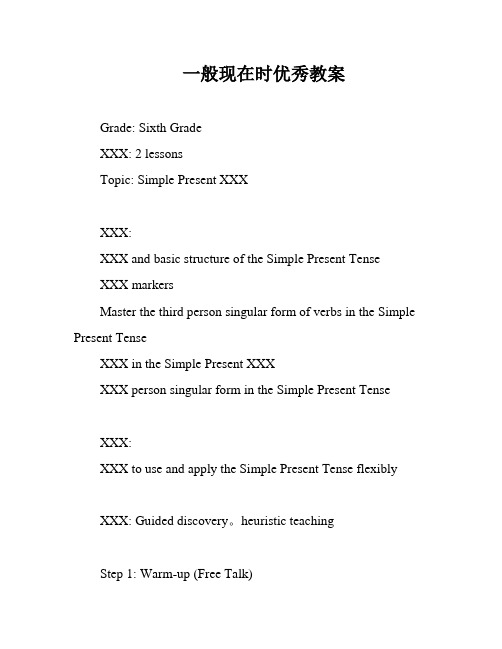一般现在时优秀教案[1]
英语一般现在时教案模板

英语一般现在时教案如何设计英语一般现在时教案?那么,下面请参考小编给大家整理收集的英语一般现在时教案模板,希望对大家有帮助。
英语一般现在时教案模板1一、教学内容:一般现在时及否定句二、教学对象:5年级三、教学步骤:1、导入:同学们,前面我们陆续已经学习了好几个语法,我们一起来回忆下都有哪些?(板书:名词;be动词;代词;用英语表达“有”)。
现在我们一起来欣赏一篇文章2、新课(PPT)My FamilyThere are four people in my family. They are my father, mother, sister and I.I am a student. I like English. I always go to school on foot. My father is a driver. He likes reading book. My mother is a nurse. She works in No.1 hospital. Usually , my mother goes to work by car. My little sister is a cute baby. She can sing and dance.We like sports and we often run in the morning .What about you?Ok,我们一起来看下红色部分的单词like—likes--like go—goes ; 这些单词有什么不同?它们的意思是一样的吗?有变化吗?对了,没有,意思没变,这些变化都是由语法造成的,动词的变化不会影响意思。
这个语法就是我们今天要学的一般现在时。
什么是一般现在时呢?我们昨天做的事叫过去时,现在做的事叫现在进行时,明天或以后做的事,叫将来时,那什么是一般现在时呢? 吃饭,你昨天吃了,今天吃不吃,明天又吃不吃? 睡觉,你昨天睡觉了,今天睡觉吗,明天还睡觉吗?学习,你昨天学习了,今天还要学习,明天还是要学习。
一般现在时标准教案

一般现在时标准教案第一章:一般现在时的概念与用法1.1 一般现在时的定义引导学生了解一般现在时表示的动作或状态是经常发生或习惯性的,通常与经常、总是、有时候、每天等频度副词连用。
1.2 一般现在时的构成讲解主语为第三人称单数时,动词要使用三单形式;主语为非第三人称单数时,动词原形不变。
1.3 一般现在时的常见句型展示一般现在时的肯定句、否定句和疑问句结构,让学生进行区分和练习。
第二章:一般现在时的主谓一致2.1 主语为第三人称单数时解释主语为第三人称单数时,动词要使用三单形式,如:He goes to school every day.2.2 主语为名词复数公司、学科、国家等时强调当主语为名词复数公司、学科、国家等时,动词仍使用原形,如:The students like music.2.3 主语为非第三人称单数时讲解主语为非第三人称单数时,动词原形不变,如:My mother cooks dinner every evening.第三章:一般现在时的频度副词3.1 频度副词的概念与用法介绍频度副词如:always, often, usually, sometimes, rarely等,并讲解它们与一般现在时的搭配。
3.2 频度副词的位置强调频度副词应放在主语和动词之间,如:She often goes to the gym.3.3 频度副词的否定句和疑问句结构展示频度副词的否定句和疑问句结构,让学生进行区分和练习。
第四章:一般现在时的特殊句型4.1 一般现在时的there be句型讲解一般现在时的there be句型结构,如:There is a book on the table.4.2 一般现在时的have/has got句型解释have/has got句型表示拥有,如:I have a bike.4.3 一般现在时的with/have/has句型讲解with/have/has句型表示伴随情况,如:She has her lunch with her. 第五章:一般现在时的练习与运用5.1 一般现在时的情境对话提供情境对话,让学生练习使用一般现在时表达日常生活中的动作或状态。
一般现在时讲解教案

一、教案基本信息1. 一般现在时讲解教案2. 适用年级:五年级3. 教学目标:让学生理解一般现在时的概念和用法能够正确运用一般现在时描述动作或状态能够辨别一般现在时与其他时态的区别4. 教学重点:一般现在时的构成:主语+ 动词原形一般现在时的用法:描述习惯性动作或状态5. 教学难点:正确运用一般现在时描述动作或状态辨别一般现在时与其他时态的区别二、教学方法1. 讲授法:讲解一般现在时的概念、构成和用法2. 示例法:通过举例让学生理解一般现在时的用法3. 练习法:设计练习题让学生巩固所学知识4. 小组讨论法:分组讨论,让学生互相交流学习心得三、教学内容1. 第一课时:引入一般现在时的概念讲解一般现在时的构成:主语+ 动词原形举例说明一般现在时的用法:描述习惯性动作或状态2. 第二课时:通过示例让学生进一步理解一般现在时的用法讲解一般现在时与其他时态的区别(一般过去时、一般将来时)设计练习题,让学生辨别一般现在时与其他时态3. 第三课时:讲解一般现在时的否定句:主语+ do/does/did not + 动词原形讲解一般现在时的疑问句:do/does/did + 主语+ 动词原形设计练习题,让学生运用一般现在时的否定句和疑问句4. 第四课时:讲解一般现在时的被动语态:主语+ am/is/are + 过去分词举例说明一般现在时被动语态的用法设计练习题,让学生运用一般现在时的被动语态5. 第五课时:复习一般现在时的概念、构成和用法设计综合练习题,让学生全面运用一般现在时总结本节课时内容,布置课后作业四、教学评价1. 课后作业:检查学生对一般现在时的掌握程度2. 课堂练习:观察学生在练习中的表现,及时发现问题并进行针对性地讲解3. 小组讨论:评估学生在讨论中的参与程度和理解程度五、教学资源1. PPT课件:展示一般现在时的概念、用法、例子等2. 练习题:设计不同难度的练习题,巩固学生对一般现在时的掌握3. 小组讨论材料:提供相关话题,让学生进行小组讨论六、教学延伸活动1. 制作时间胶囊:让学生设想自己五年后的样子,用一般现在时描述自己的状态和习惯,将纸条放入时间胶囊中,约定五年后打开。
一般现在时标准教案

一般现在时标准教案第一章:一般现在时的概念与用法1.1 一般现在时的定义解释一般现在时表示的动作或状态是经常发生或习惯性的强调动作或状态的持续性1.2 一般现在时的构成动词原形或动词的三单形式主语与动词的搭配规则1.3 一般现在时的用法描述习惯性动作或经常发生的事情描述普遍真理或事实描述动物或物的特征第二章:一般现在时的动词变化规则2.1 规则动词的变化直接使用动词原形在动词原形后加上-s或-es2.2 不规则动词的变化特殊动词变化举例(如:be, have, do等)动词变化练习2.3 主语与动词的搭配单数第三人称变化规则复数主语与动词的搭配第三章:一般现在时的否定句与疑问句3.1 否定句的构成使用do/does/did的否定形式动词原形或不带to的不定式3.2 疑问句的构成使用do/does/did的疑问形式动词原形或不带to的不定式3.3 特殊疑问词的使用特殊疑问词(如:what, who, when, where等)的用法使用特殊疑问词构成一般现在时的疑问句第四章:一般现在时的句型结构与练习4.1 句型结构主语+ 动词原形/三单形式+ 其它主语+ 助动词(do/does/did)+ 动词原形/三单形式+ 其它4.2 句型练习编写一般现在时的简单句改写句子:将一般现在时句子改为否定句和疑问句第五章:一般现在时的应用场景5.1 描述日常生活中的习惯举例说明(如:I brush my teeth every morning.)学生练习(如:My mother cooks dinner every evening.)5.2 描述经常发生的动作举例说明(如:The sun rises in the east.)学生练习(如:My brother goes to school bus.)5.3 描述普遍真理或事实举例说明(如:Apples are healthy.)学生练习(如:Birds can fly.)第六章:一般现在时的特殊句型6.1 特殊句型一:There is/There are介绍句型的用法和构成举例说明:描述某个地方或场景中的物品数量学生练习:编写句子描述教室、房间等场景6.2 特殊句型二:主语+ have/has介绍句型的用法和构成举例说明:描述拥有某物或某种特征学生练习:编写句子描述自己和他人的特征和拥有物品第七章:一般现在时的时态转换7.1 转换为一般过去时介绍如何将一般现在时句子转换为一般过去时句子举例说明:通过改变动词形式来表示过去发生的动作学生练习:改写句子从一般现在时到一般过去时7.2 转换为一般将来时介绍如何将一般现在时句子转换为一般将来时句子举例说明:使用will或助动词来表示将来发生的动作学生练习:编写句子描述将来的计划或预测第八章:一般现在时的语法练习8.1 填空练习提供句子片段,让学生填入正确的一般现在时动词形式涵盖不同主语和时态结构的练习8.2 选择题练习提供多个选择题,让学生选择正确的一般现在时动词形式涵盖不同主语和时态结构的练习8.3 改写句子练习要求学生将句子改写为一般现在时涵盖否定句、疑问句和特殊句型的改写第九章:一般现在时的综合应用9.1 对话练习提供对话场景,要求学生使用一般现在时进行对话涵盖不同主题和情境的对话练习9.2 故事编写要求学生编写一个故事,使用一般现在时描述故事中的动作和状态鼓励学生创造有趣的情节和角色10.1 复习重点回顾一般现在时的概念、动词变化规则、句型结构等要点强调一般现在时的用法和时态转换10.2 测试提供一份测试题,涵盖一般现在时的各个知识点包括选择题、填空题、改写句子等题型测试学生对一般现在时的掌握程度重点和难点解析六、一般现在时的特殊句型"There is/There are"句型的使用是描述存在的情境,对于学生来说,理解其与一般现在时的结合使用可能是一个难点。
一般现在时讲解教案

一、教学目标:1. 让学生理解一般现在时的概念和用法。
2. 能够正确运用一般现在时描述经常发生的动作或存在的状态。
3. 学会一般现在时的句子结构。
二、教学内容:1. 一般现在时的定义和用法。
2. 一般现在时的句子结构:主语+ 动词原形/动词三单。
3. 一般现在时的常见时间状语:always, usually, often, sometimes, never, rarely等。
三、教学重点与难点:1. 教学重点:一般现在时的概念、用法和句子结构。
2. 教学难点:一般现在时的句子结构转换和时间状语的运用。
四、教学方法:1. 采用情境教学法,通过生活情境引导学生理解和运用一般现在时。
2. 使用任务型教学法,让学生在完成任务的过程中巩固一般现在时的知识。
3. 运用小组合作学习,提高学生的参与度和积极性。
五、教学过程:1. 导入:利用图片或实物展示,引出一般现在时的概念。
2. 讲解:讲解一般现在时的定义、用法和句子结构。
举例说明一般现在时的常见时间状语。
3. 练习:让学生进行一般现在时的句子练习,注意句子结构的正确性。
4. 任务:布置一道生活情境题,让学生运用一般现在时完成任务。
5. 总结:对本节课的内容进行总结,强调一般现在时的关键点。
6. 作业:布置相关练习题,让学生巩固所学知识。
7. 课后反思:针对课堂教学效果,进行课后反思,为下一节课的教学做好准备。
六、教学评价:1. 评价学生对一般现在时的概念和用法的理解程度。
2. 评价学生能否正确运用一般现在时描述经常发生的动作或存在的状态。
3. 评价学生掌握一般现在时的句子结构和时间状语的运用情况。
七、教学资源:1. 课件:制作包含一般现在时定义、用法、句子结构和时间状语的课件。
2. 练习题:准备一些一般现在时的练习题,包括选择题、填空题和句子改写题。
3. 生活情境题:设计一些与学生生活相关的情境题,让学生运用一般现在时解决实际问题。
八、教学进度安排:1. 课时:本节课计划用2课时完成一般现在时的教学。
一般现在时教案

一般现在时优秀教案一、教学目标1. 让学生掌握一般现在时的概念和用法。
2. 能够正确运用一般现在时描述经常发生的动作或存在的状态。
3. 提高学生的英语语法水平和口语表达能力。
二、教学内容1. 一般现在时的定义和构成。
2. 一般现在时的用法和注意事项。
3. 动词的第三人称单数变化规则。
三、教学重点与难点1. 教学重点:一般现在时的概念、用法和动词第三人称单数的变化。
2. 教学难点:一般现在时的运用和动词第三人称单数的特殊情况。
四、教学方法1. 采用任务型教学法,让学生在实际操作中掌握一般现在时的用法。
2. 运用情景教学法,创设生活情境,让学生在情境中运用一般现在时。
3. 采用分组合作学习,提高学生的团队协作能力和口语表达能力。
五、教学准备1. 教材:人教版《英语》教材。
2. 课件:一般现在时PPT。
3. 练习题:一般现在时相关练习题。
4. 教学道具:卡片、图片等。
六、教学过程1. 导入:通过与学生谈论日常生活中的习惯和行为,引出一般现在时的概念。
2. 讲解:讲解一般现在时的定义、构成和用法,重点讲解动词第三人称单数的变化规则。
3. 互动:学生分组讨论,举例说明一般现在时的用法。
4. 练习:学生完成一般现在时的相关练习题,教师点评并讲解。
5. 拓展:引导学生运用一般现在时描述自己的家庭成员和朋友。
七、案例分析通过分析一些日常生活中的案例,让学生更好地理解和运用一般现在时。
例如:1. 描述自己的作息时间:I get up at 7 o'clock in the morning and go to school at 8 o'clock.2. 描述朋友的兴趣爱好:My friend likes playing soccer and he isa good player.八、课堂小结总结本节课所学内容,强调一般现在时的用法和动词第三人称单数的变化规则。
鼓励学生在日常生活中多运用一般现在时进行交流。
一般现在时标准教案

一般现在时标准教案第一章:一般现在时的概念与用法1.1 教学目标让学生理解一般现在时的概念让学生掌握一般现在时的构成让学生学会一般现在时的基本用法1.2 教学内容一般现在时的定义一般现在时的构成:主语+ 动词原形一般现在时的基本用法:描述习惯、能力、状态等1.3 教学活动引入:通过图片或情境引导学生思考现在时态讲解:讲解一般现在时的概念、构成和用法练习:学生分组练习,用一般现在时描述图片或情境第二章:一般现在时的肯定句2.1 教学目标让学生掌握一般现在时的肯定句结构让学生能够正确运用一般现在时表达肯定句2.2 教学内容一般现在时的肯定句结构:主语+ 动词原形肯定句的例句和练习2.3 教学活动讲解:讲解一般现在时的肯定句结构和例句练习:学生分组练习,用一般现在时构造肯定句第三章:一般现在时的否定句3.1 教学目标让学生掌握一般现在时的否定句结构让学生能够正确运用一般现在时表达否定句3.2 教学内容一般现在时的否定句结构:主语+ do/does/did not + 动词原形否定句的例句和练习3.3 教学活动引入:通过图片或情境引导学生思考一般现在时的否定句讲解:讲解一般现在时的否定句结构和例句练习:学生分组练习,用一般现在时构造否定句第四章:一般现在时的疑问句4.1 教学目标让学生掌握一般现在时的疑问句结构让学生能够正确运用一般现在时表达疑问句4.2 教学内容一般现在时的疑问句结构:do/does/did + 主语+ 动词原形疑问句的例句和练习4.3 教学活动讲解:讲解一般现在时的疑问句结构和例句练习:学生分组练习,用一般现在时构造疑问句第五章:一般现在时的特殊句型5.1 教学目标让学生掌握一般现在时的特殊句型让学生能够正确运用一般现在时表达特殊句型5.2 教学内容一般现在时的特殊句型:there be句型、have/has句型特殊句型的例句和练习5.3 教学活动引入:通过图片或情境引导学生思考一般现在时的特殊句型讲解:讲解一般现在时的特殊句型结构和例句练习:学生分组练习,用一般现在时构造特殊句型第六章:一般现在时的常用动词6.1 教学目标让学生掌握一般现在时中常用的动词让学生能够正确运用这些动词构造一般现在时句子6.2 教学内容常用动词列表及其用法动词第三人称单数形式的变化规则动词练习及应用引入:通过情境或故事引入常用动词讲解:讲解常用动词的第三人称单数形式及用法练习:学生分组练习,用常用动词构造一般现在时句子第七章:一般现在时的语境应用7.1 教学目标让学生能够理解一般现在时的语境让学生在实际情境中正确运用一般现在时7.2 教学内容一般现在时的常见语境:日常生活、规律习惯、普遍事实等情境对话及应用练习7.3 教学活动引入:通过图片或情境介绍一般现在时的语境讲解:讲解一般现在时的常见语境及应用练习:学生分组进行情境对话,运用一般现在时第八章:一般现在时的主谓一致8.1 教学目标让学生掌握一般现在时主谓一致的规则让学生能够正确运用主谓一致构造一般现在时句子8.2 教学内容主谓一致的规则:名词单数、复数及不可数名词的主谓一致主谓一致的练习及应用引入:通过例句引导学生思考主谓一致的问题讲解:讲解主谓一致的规则及注意事项练习:学生分组练习,注意主谓一致运用一般现在时句子第九章:一般现在时的综合练习9.1 教学目标让学生综合运用一般现在时的知识提高学生的一般现在时运用能力9.2 教学内容综合练习题:选择、填空、翻译等练习及解答9.3 教学活动引入:通过情境或故事引入综合练习讲解:讲解练习题的解题思路及方法练习:学生独立完成练习题,教师点评及讲解第十章:一般现在时的拓展与应用10.1 教学目标让学生进一步拓展一般现在时的知识提高学生的一般现在时应用能力10.2 教学内容拓展知识:一般现在时的其他用法及注意事项应用练习:故事创作、情境表演等引入:通过情境或故事引入拓展知识讲解:讲解一般现在时的其他用法及注意事项练习:学生进行故事创作或情境表演,运用一般现在时重点和难点解析一、一般现在时的概念与用法重点环节:理解一般现在时的概念和用法。
一般现在时优秀教案

一般现在时优秀教案Grade: Sixth GradeXXX: 2 lessonsTopic: Simple Present XXXXXX:XXX and basic structure of the Simple Present TenseXXX markersMaster the third person singular form of verbs in the Simple Present TenseXXX in the Simple Present XXXXXX person singular form in the Simple Present TenseXXX:XXX to use and apply the Simple Present Tense flexiblyXXX: Guided discovery。
heuristic teachingStep 1: Warm-up (Free Talk)Step 2: XXX1.Clarify the concept of the Simple Present Tense2.Explain the time markers for the Simple Present Tense3.Guide students to create their own XXX person singular form in the Simple Present TenseXXX:4.XXX in the Simple Present Tense5.XXX6.XXX mistakes7.Summarize the key points of the lesson8.Assign homeworkStep 1: Warm-up (Free Talk)Step 2: XXXI。
Simple Present XXXA。
What is the Simple Present Tense?1.It expresses a current state or n。
- 1、下载文档前请自行甄别文档内容的完整性,平台不提供额外的编辑、内容补充、找答案等附加服务。
- 2、"仅部分预览"的文档,不可在线预览部分如存在完整性等问题,可反馈申请退款(可完整预览的文档不适用该条件!)。
- 3、如文档侵犯您的权益,请联系客服反馈,我们会尽快为您处理(人工客服工作时间:9:00-18:30)。
中考专题复习-一般现在时Step 1 Warm up (free talk)Step 2:知识点拨一、一般现在时(The Simple Present Tense)(一)什么是一般现在时??1.表示现在的状态:e.g. They are very busy2.表经常或习惯性的动作,常与频度副词连用。
e.g. I get up at six every morning.3.表主语具备的性格、能力和兴趣爱好等:e.g.4.客观真理eg:The moon moves round the earth.(二)一般现在时的时间状语——一般现在时的动词常与often, usually, always,sometimes,never等频度副词连用。
always> usually>often>sometimes >seldom>neverEg:Tom 经常早上六点起床。
Tom often gets up at six o’clock.2. every day, once a week,on Sundays等。
Eg: 他一星期去一次动物园。
He goes to the zoo once a week.(三)一般现在时的构成1. be 动词的一般现在时的句式:肯定句:主语+be+表语(n., adj等)否定句:主语+be+ not+表语一般疑问句:Be+主语+表语?特殊疑问句:疑问词+be+主语?有be动词,变疑问,Be提前,句末问号别忘记。
变否定,更容易,be加not要牢记Tips:当主语为第一人称时在一般疑问句中要改为第二人称you, 同理you也要改为I, we. 口诀:一变二、二变一、三不变2.实义动词的一般现在时句式:肯定句:主语(I/We/You/They)+实义动词+其他主语(He/She/It)+实义动词三单现形式+其他否定句:主语(I/We/You/They)+do+ not+动词原形+其他主语(He/She/It)+does +not+动词原形+其他一般疑问句:Do+主语(I/we/you/they)+动词原形+其他?Does+主语(he/she/it)+动词原形+其他?特殊疑问句:疑问词+ do/does+主语+动词原形+其他复习动词三单式1)动词三单形式变化规律1. 一般情况下,直接在词尾加()eg: work---works2. 以x, s, o, sh, ch结尾的动词,在词尾加( )eg: wash—washes watch—watches3. 以辅音字母加y 结尾的动词,把y 变为( ) 加( ) eg:study—studies练习:do -- go -- read -- look-- play-- enjoy--fix-- teach-- wash-- pass-- carry-- watch--box-- study-- swim--谓语为实义动词,变疑问,一二人称和复数do 提前,三单把does 来帮助,句末问号别忘记变否定,也容易,do/does加not就OK!Step3、拓展练习1.The bike nice.How much______it______?(cost)2.The shop___________(close)at this time of day.3.My teacher often_________(tell)us not to play on thestreet.4.Light___________(travel)much faster than sound.Step4 一般现在时专项练习1.This is my pencil ? (变一般疑问句) your pencil ?2. These red socks are Kate’s . (变一般疑问句) socks Kate’s ?3. I want to buy a big green bag . (变特殊疑问句) you want to buy ?4. Mary does not have any books . (变肯定句)Mary books .5. The clothing shop is on sale . (变为否定句)6.She likes the black bag very much . (变为否定句)7. I buy the pants for only 50 Yuan. (用she改写句子)the pants for only 50 Yuan.8.It’s an English dictionary . (对画线部分提问)9.Lily and Lucy are fifteen years old now . (对画线部分提问)Lily and Lucy ?10. Her dog is 2 years and 5 months old . (变为否定句)Her dog 2 years and 5 months old .11. I usually get up at seven o’clock . (用he改写句子)at seven o’clock .12.He often has hamburger and apples for dinner . (变为一般疑问句)13. My family always like thrillers . (对画线部分提问)your family always like ?14. Jane’s sister wants to see the comedy . (变为一般疑问句)Jane’s sister to see the comedy ?15.Maria and Jack come to this school on Monday . (对画线部分提问)Maria and Jack come to this school ?16.Titanic is really a great sad movie . (对画线部分提问) Titanic ?17.I think this documentary is boring . (变复数句)think boring .18.Mike can play the guitar . (对画线部分提问) Mike ?19. Julia and her mother can live (居住) in the same city . (变一般疑问句)Julia and her mother live in the same city ?20.The teacher wants to join a music club . (变为特殊疑问句)club the teacher want to join ?二.用be动词的适当形式填空。
1. I a student . You a teacher .2. She my friend.3. you Li Fen ? No, not .4. Mr. green very busy?Yes , he .5. He must at home .6. Comedy very interesting .7. thrillers very scary ? 8. You and I good friends .9. His friends very funny . 10. The twins very happy because they want to go to a movie .11. Our class big , but their class small .12. The basketball club exciting and fun . 13. The girl in red clothes my sister .14. Lily’s room not very big . 15. It _______ nice to meet you.16. Your name _______ nice. 17. What class you in ?18. ________ your Number Seven?三.用所给动词的适当形式填空。
1. My classmate (know) the man on the bike .2. His sister usually (go) to school at 7:00 am .3. Lin Tao (like) his new sweater .4. Let me (have) a look .5. Let’s (play) tennis !6. he (like) English ?7. I want (go) to a movie . 8. He (not know)the teacher’s name . 9. Nice (meet) you ! 10. Can I (ask) the policeman ?11. (sit) down and (have) a cup of tea . 12. (not look) at your book !13. you (can see)the bananas on the table ?14. I need (buy ) some new clothes .15. She likes (play) chess .16. It’s time (play) games . 17. You must (be) a good student .18. She must (sing) well . 19. He (have) an egg and a banana for breakfast .20. Li Min (take) a shower after lunch .四、中考专练1、(2016重庆B卷)-when shall we begin our meeting?-We’ll begin it when Helen .esB.cameC.will come D come2、(2015辽宁)-Our teacher with us often games after class .-Your teacher is so nice!A.playB.playedC.is playingD.plays3、(2016贵州)If it tomorrow ,we won’t climb the Doupeng Hill.A.will rainB.rainsC.is rainingD.rain。
